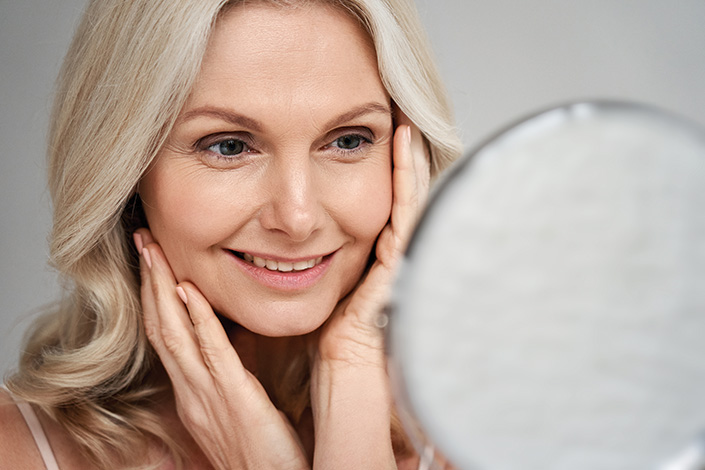By Dr. Dawn M. Hansen
A year after a woman’s period ends, menopause begins. This natural process brings on a hormonal shift, as well as changes in the skin that require specific care.
We all know our skin changes as we age, but during menopause, these alterations accelerate and differ from those experienced before. The skin can’t retain water as well and becomes drier. Bruising intensifies as estrogen levels fall and skin becomes thinner. Hair loss on the head is coupled with facial hair growth, all due to falling hormone levels. Age spots and other signs of sun damage may appear, as well as facial changes (jowls, wrinkles, sagging) when collagen levels dip, along with acne, rashes and irritated skin, facial flushing and slowly healing wounds.
The good news is we can act to address these menopause-induced skin changes. It starts with fostering an environment for healthy skin, which requires proper nutrition, routine exercise, avoiding damaging habits, hydration, utilizing sun protection and a personalized skincare regimen.
NUTRITION
A healthy diet is especially important during menopause because it can get ahead of future issues that can arise due to a changing metabolism. Doctors recommend a diet rich in calcium, vegetables, lean protein and soy products. It is also important to consume antioxidants in the form of fruits and nuts. Drinking plenty of water and consuming foods high in water content is advised to combat a loss of water the body and skin may experience.
EXERCISE
Regular physical activity is not only beneficial for overall health, but it can greatly improve skin health. Exercise improves blood flow, which facilitates the removal of toxins from the skin and nourishment of cells; provides an environment of low stress, resulting in low stress on the skin and improvement of chronic skin conditions; and even helps prevent and visually reverse the signs of aging.
HABITS
One of the quickest ways to expedite skin aging is to partake in harmful habits like smoking and excessive drinking. Smoking can lead to a dull complexion and wrinkles due to its effects on blood vessels and collagen. Consuming high levels of alcohol causes the skin to lose the moisture and nutrients it needs to appear healthy.
HYDRATION
Staying well-hydrated is vital to skin health, and women going through menopause are prone to dry skin. Drinking lots of water and consuming foods with high water content are great ways to help skin stay hydrated. Furthermore, hydrating moisturizers that contain ceramides, glycerin and hyaluronic acid can help reduce dryness. Avoid moisturizers with a high water content.
SUN PROTECTION
Skin is especially sensitive during menopause, so it is important to protect it from UV rays using a broad-spectrum SPF and protective clothing. Choose an SPF of at least 30 or higher, and reapply every two hours.
SKINCARE REGIMEN
Some helpful products that menopausal women can use to care for their skin include retinol, hydrating skin cleansers and chemical exfoliating products. Retinol is a form of Vitamin A that is used to treat acne and has anti-aging properties. This nighttime topical treatment is great for unclogging pores and improving skin’s appearance. Talk to your dermatologist before beginning a retinol treatment.
Choose a hydrating cleanser that includes ceramides or glycerin to introduce moisture into the skin without stripping natural oils. Using chemical exfoliants on menopausal skin is a gentler alternative to physical exfoliating because the skin is sensitive during this time. The recommended chemical exfoliants to use are hydroxy acids (AHAs), beta hydroxy acids (BHAs) and enzymes (PHAs). Speak with your dermatologist before beginning a chemical exfoliant.
TREATMENTS
Facial flushing, or hot flashes, are common during menopause and can be caused by certain triggers like smoking, a lack of exercise, heat, warm beverages or spicy foods. Treatments include hormone replacement therapy, non-hormonal medications, over-the-counter medications and avoidance of triggers.
Besides making lifestyle and skincare changes at home, many treatments are available in a clinical setting to improve the appearance of aging skin. For instance, non-ablative laser treatments are becoming more common among menopausal women. This process uses a laser to diminish wrinkles, brown spots and minor scars by creating heat in the skin without injuring the surface. The laser-generated heat promotes collagen production, which causes the skin to tighten and look younger and healthier.
Facial volume loss is one of the biggest visual signs of menopausal skin changes. To help reverse this effect, filler treatments can be performed by a clinical dermatologist.
Menopause can cause or exacerbate skin problems, but luckily, there are ways to reduce the impact and create an environment for healthier skin. Exercise, nutrition, hydration, sun protection, a specialized skincare routine and professional treatments are important steps on a journey toward better skin health.
Dr. Dawn M. Hansen, FACP, is a board-certified internal medicine specialist with Dermatology Specialists of Mississippi and has 25-plus years of dermatology experience. Reach her at (228) 207-5140.


